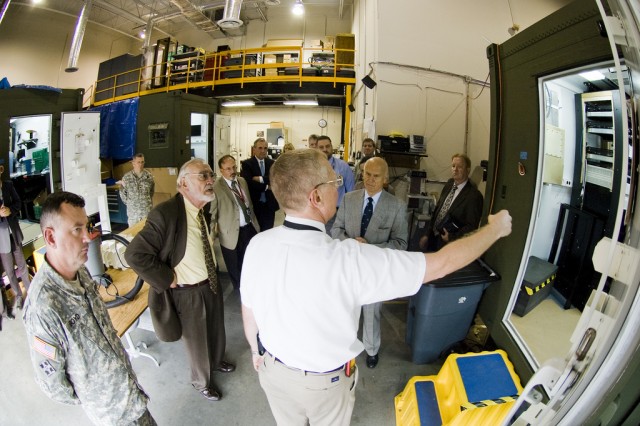ABERDEEN PROVING GROUND, Md. -- The Army is taking a critical look at how it acquires and manages equipment and services. A team from the Army Acquisition Review visited here Sept. 28, touring facilities and interviewing military officials.
Secretary of the Army John M. McHugh commissioned the review in May. The team is a panel of experts, co-chaired by former Army Acquisition Executive Gil Decker and former Army Materiel Command Commanding General Gen. (Ret.) Lou Wagner. The panel is empowered to seek answers and offer solutions after four months of exhaustive interviews and studies.
The U.S. Army Research, Development and Engineering Command leadership spoke with Decker and his team as they toured Army Research Laboratory facilities at APG.
Decker said the panel is looking at how the Army can improve the acquisitions process from identifying requirements until a piece of equipment is retired.
"I believe that Secretary McHugh and the Chief of Staff, General Casey, are dead serious about finding ways to improve the Army acquisition process, make it more efficient and timelier," Decker said. "Considering the situation we're in with the economy of the nation and all those factors, we're looking for ways to do that.
During the tour, Decker, former Deputy Assistant Secretary of the Army for Research and Technology George Singley and Lt. Gen. (Ret.) William "Bud" Forester saw how RDECOM is using intellectual property owned by the Army to "level the playing field" with contractors.
The Army Research Laboratory's David Lyon showed them examples of precision munitions and explained how the Army is approaches acquisition. Lyon is chief of ARL's Guidance Technology Branch.
"We were looking for ways to save money by using Army-owned intellectual property," Lyon explained. "This munitions technology demonstration cost the Army about $6 million. Comparable costs using traditional contracting methods may have been as high as $100 million."
Lyon also said before the first round is ever produced, researchers have virtually fired it thousands of times using computer-based simulations and hardware in the loop simulations.
"This is the key to controlling costs," Lyon said.
Decker served as the Army's chief acquisition officer in the mid-1990s. As the former Assistant Secretary of the Army for Research, Development and Acquisition and Science Advisor to the Secretary, he brings a strong foundation to the review panel.
"We're looking at things that we hope can help the Army," he said. "It isn't just looking for cost efficiencies, although that's part of it. It's looking for ways to do the process better."
Major Gen. Nick Justice viewed the visit as "a great opportunity to shape the future."
"I think Mr. Decker and the panel have an understanding of the potential for improving the acquisition process and the challenges we face," he said.
Decker said since 1990 the Army saw 23 major programs terminated before completion.
"There were different reasons for that, but that's a high volume of major programs that didn't get completed," he said. "We're looking at that, and case studies, and trying to see what caused that and what the Army might do so when they start a program it's got a good chance of being completed."
After the tour, Forester said the panel's review is important.
"We've seen successes in supporting the Warfighter," Forester said. "But, we have to look at the process of how we are identifying the Army's needs and rapidly turning around equipment."
During its four-month long commission, the panel has spoken extensively with various leaders across the Army.
"I suspect the Secretary of the Army wouldn't have personally commissioned this panel if he wasn't serious about looking for some things," Decker said. "We're hoping to find recommendations that the Army can implement without having to torpedo and start over. We can't do that and there won't be any magic solution. But, we're looking hard at the requirements process because if you can't come out with a requirement that is understandable, it gets worse downstream."
As the 120-day acquisition review is in its closing days, Decker reflected on the impact of the forthcoming final report to the Secretary of the Army.
"I hope it's important," he said. "Our hearts are in the right place."


Social Sharing